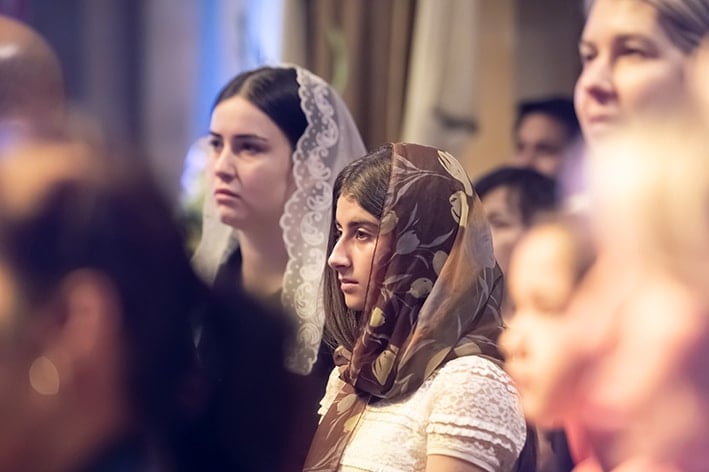
Let’s look again at the 1241 Australian Catholic women in my larger study. Are they as radical and hungry for change as we’ve been told?
It’s good to see that 84 per cent of women “weeklies”—those who go to Mass at least every Sunday—firmly believe in the existence of God, compared to 46 per cent of “irregulars” and 37 per cent of “nevers.”
This is probably why 90 per cent of them pray at least daily—twice as many as the irregulars and nevers.
Also, 75 per cent of women weeklies go to confession several times a year (33 per cent go at least monthly). Are you surprised that just five per cent of irregulars and eight per cent of nevers go?
Around 47 per cent of the weeklies say that the church is the most important part of their lives. Just two per cent of the irregulars and nevers agree with that statement.
And around 75 per cent of the women weeklies want their children to marry other. Catholics, compared to 30 per cent of irregulars and 18 per cent of nevers.
Let’s look at their doctrinal and moral beliefs. Our women weeklies believe in the following: heaven (94 per cent), the real presence (93 per cent), life after death (91 per cent), religious miracles (89 per cent), the intercession of the saints (87 per cent), hell (80 per cent), and purgatory (75 per cent).
If our irregulars and nevers believe in anything strongly, it’s the existence of heaven (64 per cent). Otherwise, they’re very mixed.
For example, just 46 per cent of women irregulars and 37 per cent of nevers believe in the real presence. That’s the same rate as those who firmly believe in God.
Yet around 60 per cent of the women irregulars describe themselves as “very religious”, as do 49 per cent of nevers. And 69 per cent of irregulars felt “very affiliated” to the church.
What about sexual morality?
Our weekly women believe that the following are all sins: abortion (83 per cent), sex outside of marriage (78 per cent), homosexual activity (71 per cent), remarriage without annulment (66 per cent), and using contraception (59 per cent).
These numbers felt too low. So I split the women up into the over-40s and under-40s.
Suddenly everything changed – the under-40s swung in strongly behind traditional Catholic morality, while the over-40s didn’t.
For example, just 73 per cent of women weeklies over 40 said that sex outside of marriage was a sin. But this rose to 92 per cent of the under-40 weeklies.
And if we go back and look at core Catholic beliefs like the existence of purgatory and the real presence, all the numbers shot up to over 90 per cent in the under-40s. (I just heard the Holy Souls say “Phew!”).
The women weeklies aged under 40 didn’t support married or women clergy or changing the church’s teaching on pretty much anything. Those who are having children are also very low users of artificial forms of contraception, and higher users of NFP.
The irregulars and nevers were the opposite: heavily in favour of sweeping changes to Holy Orders and the church’s teaching on other issues.
So what about their views of church leadership? Almost all of the women answered an optional question on this. Forty-nine per cent of irregulars and 66 per cent of nevers rated it as poor—but so did 41 per cent of the weeklies.
The women weeklies were kinder when it came their local bishop’s leadership—42 per cent rated it as good. But around 50 per cent of both irregulars and nevers rated their local bishop’s leadership as poor.
Given this, it’s hard to claim that Australian Catholic massgoing women are a radical voting bloc who want major changes to church teaching and practice. The irregulars and nevers might be but they’re also older, less invested, and less affiliated.
They don’t believe in most of it or agree with it. But that doesn’t stop them wanting sweeping changes in the church they abandoned a long time ago.
In the recent Plenary Council, one group of female voices dominated. They’re like the irregulars and nevers in this survey.
They are older, better educated, and feel very religious and affiliated to the church. But they don’t share most of its core beliefs or practices, which is why they want them changed.
Which one of these groups of women—weeklies, irregulars, or nevers—do you think best represents the future of the church in Australia?
